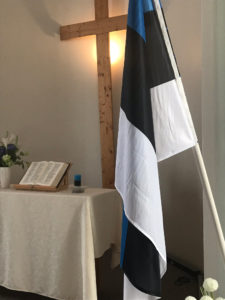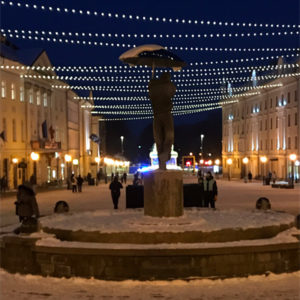I recently traveled to Estonia to celebrate the country’s 100th anniversary since first declaring independence.
In the 1990s, I was a part of two Baptist Student Ministry teams who traveled to the small North European country as part of a partnership between the BGCT and the Estonian Baptist Convention. I fell in love with the country and have returned twice in recent years for vacation and sabbatical.
The similarities of the timing of these recent trips have been striking. The day before I left in 2015, nine people were killed and 18 others injured during a shootout between two biker gangs at a restaurant just a few miles from my house in Waco. This year, the day before I left, 17 people died and 17 more were injured (mostly children) in a mass shooting at a school in Parkland, Florida.
Traveling and taking time away from your regular life always has a way of sparking reflection about your home. These events heightened that experience for me, as Estonia, like most civilized countries, is a place where these things just don’t occur.
This isn’t a reflection on guns, so you can put yours back in its holster.
‘A different kingdom’

The Estonian churches I visited this time around had the 100th anniversary of Estonian independence on their minds. Each of them had the tricolor, blue-black-white flags and candles up in their sanctuary, and preachers gave sermons with the occasion as the backdrop. Estonians tend to be a reserved bunch and don’t wear their hearts on their sleeves, but they love their country, which was evident during my time there.
I visited with an old acquaintance, a pastor at one of the Baptist churches in Tartu. While chatting over coffee in his office, I motioned toward the Estonian flag in the corner of his office. I noted how I’d seen more of these in churches than I had at any point before and asked if it was normal to have so many of them in worship spaces.
He looked at me curiously, like I was asking him if he regularly displayed photos of unicorns in church. He said, “Of course not. That represents a different kingdom than one we are a part of.”
In fact, he said the reason the flag was out in his office at that moment was that he had just purchased one to be displayed for the centennial celebration and needed it to hang out to get rid of the creases from being folded in its package.
‘An anomaly’
Only 28 percent of Estonians identify with any Christian group. The majority of those are nominally Lutheran or Orthodox. They are sometimes baptized in those churches and never step foot in a church again until their funeral. A minuscule number of Christians are evangelicals, and out of the 1.3 million people in the country, less than 5,000 of them are Baptists.

In America, and especially in Texas, deciding to become a Christian often represents a step up on the social ladder. It can be more harmful to your career and status in our culture not to be a Christian than to be one.
Shortly after we move to a new town, we are asked, “Have you found a church yet?” The assumption is, of course, that we are looking for one. Within the fabric of America, many of us have the Christian story sewed in like needlepoint — so much so that we can no longer tell which is the fabric and which is the thread.
I think this may be why I’m so intrigued by Estonia and other countries with little interest in organized religion. Being there forces me to reckon with the fact that this Christian experience I have lived in the United States is an anomaly, not the rule.
‘The most Christlike thing’
For most believers in the world and throughout history, the notion that God has some countries on a “most favored status” list is a foreign concept. They have no template for it, and the result is a Christian community who understands their place in the world. It’s a place symbolized by the cross, an instrument of death, and a Savior who raced to those on the margins, bypassing the powerful and the strong.
There are no perfect countries, and there are certainly no perfect churches. The fingerprints of God transcend borders, as do the effects of the fall. But, at the risk of appearing an alarmist, these do feel like dark times for our country.
We’ve stopped seeing each other and violence prevails. The poor are not just neglected, but ridiculed. People of color whose ancestors were brought to this land by force, and who, for most of our history, were forbidden the fruits of their ancestors’ labors by the similar force are now told that their misfortunes are their own fault.
And through all of this, much of the Church of Jesus Christ is not just a bystander, but a participant.
It’s time for us to become small. To remove the symbols of the empire we live in from our places of worship and to put on sackcloth and ashes again. It’s time for us to damn the forces of violence and darkness and to no longer be complicit in it.
In so doing, we will lose our power, which may be the most Christlike thing we have ever thought of doing.
May it be so.
Craig Nash grew up in Chandler, Texas, and is a graduate of East Texas Baptist University and Baylor’s George W. Truett Theological Seminary. He has lived in Waco since 2000, where he works for Baylor and attends University Baptist Church. If he were any more Baptist, he would need a committee on committees to help him decide who will help him make major life decisions.















We seek to connect God’s story and God’s people around the world. To learn more about God’s story, click here.
Send comments and feedback to Eric Black, our editor. For comments to be published, please specify “letter to the editor.” Maximum length for publication is 300 words.